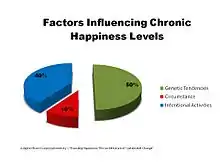Sonja Lyubomirsky
Sonja Lyubomirsky (born December 14, 1966)[1] is an American professor in the Department of Psychology at the University of California, Riverside[2] and author of the bestseller The How of Happiness: A Scientific Approach to Getting the Life You Want, a book of strategies backed by scientific research that can be used to increase happiness.[3]
Sonja Lyubomirsky | |
|---|---|
 | |
| Born | December 14, 1966 |
| Scientific career | |
| Fields | |
| Institutions | |
| Website | sonjalyubomirsky |
She is often quoted in news articles about positive psychology and happiness.[4][5][6] In the book The Only Self-Help Book You'll Ever Need, a criticism of self-help books, Lyubomirsky's The How of Happiness is praised as a self-help book that has claims backed by empirical data.[7]
Lyubomirsky is also an associate editor of the Journal of Positive Psychology.
Education
Originally from Russia, Lyubomirsky received her B.A. from Harvard University and her Ph.D. in Social/Personality Psychology from Stanford University.[8]
Awards
Lyubomirsky has been honored with a John Templeton Foundation grant, a Science of Generosity grant, a Templeton Positive Psychology Prize, and a million-dollar grant (with Ken Sheldon) from the National Institute of Mental Health.[8]
The How of Happiness

Published in 2008 by Penguin Press,[9] the book has been translated into 22 languages.[8]
The premise of The How of Happiness is (1) that happiness is worth striving for, and (2) that 50 percent of a given human's long-term happiness level is genetically determined (based on twin studies),[10] 10 percent is affected by life circumstances and situation, and a remaining 40 percent of happiness is subject to self control that can make a difference.[11][12][13][14] The strategies offered in the book are designed to target the 40 percent of happiness that is subject to manipulation.
The How of Happiness has spawned an iPhone application called Live Happy, produced by Signal Patterns. Lyubomirsky is on the company's scientific advisory board.[15]
The How of Happiness has also spawned a song called The How of Happiness Book Tune, which acts as a mnemonic aid to help readers remember the content within the book.[16]
The book was mentioned in various magazines and newspaper articles, and also led to Lyubomirsky's appearing in multiple TV and radio shows, and feature documentaries in North America, South America, Asia, the Middle East, and Europe.[8]
The Myths of Happiness
In her second book, “The Myths of Happiness” ,[17] published by Penguin Press, Sonja Lyubomirsky, drawing from research studies of hers and from all around the world, examines why the major life events that should make a person happy don’t, and that what shouldn’t make us happy often does.[18][19] What she reveals is that these misconceptions about the impact of such events are one of the main threats to a person's long-term well-being.[20]
Happiness set point
Lyubomirsky has proposed that people's happiness level is 50% due to genetic inheritance, which means people can only move their happiness up and down from a 'happiness set point'.[21] Hedonic adaptation supports this view.
References
- Who's Who of American Women (2006) Marquis Who's Who: New Providence, New Jersey.
- "13 Things That Will Make You Much Happier". The Huffington Post. 2016-04-24. Retrieved 2016-05-22.
- "Archived copy". Archived from the original on 2012-06-08. Retrieved 2013-06-29.CS1 maint: archived copy as title (link)
- "Key to happiness? Be kind, exercise". The Sydney Morning Herald. 9 September 2009. Retrieved 6 August 2018.
- https://abcnews.go.com/m/screen?id=4115033&pid=26
- "Happiness Brings Success, Not the Other Way Around". foxnews.com. 20 December 2005. Retrieved 6 August 2018.
- "Sorry, Oprah? Responses to Positive Self-Statement Research". Psychology Today. Retrieved 6 August 2018.
- "Sonja Lyubomirsky Ph.D. | Psychology Today". www.psychologytoday.com. Retrieved 2016-05-22.
- "Penguin Press - Penguin Books USA". www.penguin.com. Archived from the original on 2016-05-24. Retrieved 2016-05-22.
- Sonja Lyubomirsky, David Schkade and Kennon M. Sheldon, "Pursuing Happiness: The Architecture of Sustainable Change," Review of General Psychology, Vol. 9, No. 2, 111–131, 2005
- Halpern, Sue. "Are You Happy?". nybooks.com. Retrieved 6 August 2018.
- http://us.penguingroup.com/nf/Book/BookDisplay/0,,9781594201486,00.html
- http://www.pe.com/localnews/highereducation/stories/PE_News_Local_D_happy19.3d48c86.html
- "Happiness: A Choice We Make". The Huffington Post. 2016-04-11. Retrieved 2016-05-22.
- "Archived copy". Archived from the original on 2013-02-02. Retrieved 2009-10-01.CS1 maint: archived copy as title (link)
- "Archived copy". Archived from the original on 2011-08-17. Retrieved 2011-09-07.CS1 maint: archived copy as title (link)
- "2 ways to achieve a lifetime of happiness". Business Insider. Retrieved 2016-05-22.
- "'The Myths of Happiness': Do you know where to find it?". TODAY.com. 2013-01-02. Archived from the original on 2016-06-02. Retrieved 2016-05-22.
- "The Myths of Happiness: What Should Make You Happy, but Doesn't; What Shouldn't Make You Happy, but Does by Sonja Lyubomirsky: Review | Toronto Star". thestar.com. Retrieved 2016-05-22.
- Lyubomirsky, Sonja. "About the Book | The Myths of Happiness". themythsofhappiness.org. Retrieved 2016-05-22.
- Weil, Elizabeth. "Happiness Inc". nytimes.com. Retrieved 6 August 2018.
External links
- Lyubomirsky's webpage about The How of Happiness
- 20/20 video segment covering Lyubomirsky and The How of Happiness
- Video of Good Morning America interview with Lyubomirsky about The How of Happiness
- Op-ed piece by Lyubomirsky in the New York Times, about the 2008 economic downturn and how it did not affect happiness levels, published on December 26, 2008
- Top concepts from The How of Happiness